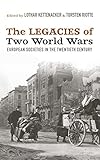The Legacies of Two World Wars : European Societies in the Twentieth Century / ed. by Torsten Riotte, Lothar Kettenacker.
Material type: TextPublisher: New York ; Oxford : Berghahn Books, [2011]Copyright date: ©2011Description: 1 online resource (334 p.)Content type:
TextPublisher: New York ; Oxford : Berghahn Books, [2011]Copyright date: ©2011Description: 1 online resource (334 p.)Content type: - 9780857451804
- 9780857452238
- 940.31 22
- online - DeGruyter
| Item type | Current library | Call number | URL | Status | Notes | Barcode | |
|---|---|---|---|---|---|---|---|
 eBook
eBook
|
Biblioteca "Angelicum" Pont. Univ. S.Tommaso d'Aquino Nuvola online | online - DeGruyter (Browse shelf(Opens below)) | Online access | Not for loan (Accesso limitato) | Accesso per gli utenti autorizzati / Access for authorized users | (dgr)9780857452238 |
Frontmatter -- Contents -- Foreword -- 1. ‘Old Europe’ and the Legacy of Two World Wars -- 2. Prevention or Regulation of War? The Hague Peace Conferences as a Limited Tool for Reforming the International System before 1914 -- 3. ‘The Spirit of 1914’: A Critical Examination of War Enthusiasm in German Society -- 4. Construction and Deconstruction of the Idea of French ‘War Enthusiasm’ in 1914 -- 5. The Mood in Britain in 1914 -- 6. The First World War in the History of the Weimar Republic -- 7. Fascism and the Legacy of the Great War -- 8. The French Desire for Peace and Security in the 1920s -- 9. Britain in the Wake of the Great War -- 10. Germany: War without Public Backing? -- 11. The French Entry into the War in September 1939: Between Reluctance and Resignation -- 12. Great Britain: Declaring War as a Matter of Honour -- 13. Disillusionment, Pragmatism, Indifference: German Society aft er the ‘Catastrophe’ -- 14. The French aft er 1945: Difficulties and Disappointments of an Immediate Post-War Period -- 15. Great Britain: Remembering a Just War (1945–1950) -- 16. Italy after 1945: War and Peace, Defeat and Liberation -- Bibliography -- Notes on Contributors -- Index
restricted access online access with authorization star
http://purl.org/coar/access_right/c_16ec
The US invasion of Iraq in 2003 was done mainly, if one is to believe US policy at the time, to liberate the people of Iraq from an oppressive dictator. However, the many protests in London, New York, and other cities imply that the policy of “making the world safe for democracy” was not shared by millions of people in many Western countries. Thinking about this controversy inspired the present volume, which takes a closer look at how society responded to the outbreaks and conclusions of the First and Second World Wars. In order to examine this relationship between the conduct of wars and public opinion, leading scholars trace the moods and attitudes of the people of four Western countries (Great Britain, France, Germany and Italy) before, during and after the crucial moments of the two major conflicts of the twentieth century. Focusing less on politics and more on how people experienced the wars, this volume shows how the distinction between enthusiasm for war and concern about its consequences is rarely clear-cut.
Mode of access: Internet via World Wide Web.
In English.
Description based on online resource; title from PDF title page (publisher's Web site, viewed 25. Jun 2024)


